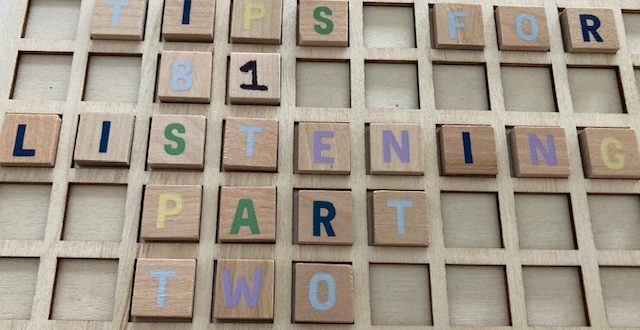How to do well in B1 Preliminary Listening Part 2
Today, I’m going to share some tips for helping students do well in Part 2 of B1 Preliminary Listening. This post follows on from the previous one, About B1 Preliminary Listening Part 2.
I’m going to analyse the Part 2 Listening from the B1 for Schools Sample Paper, available to download here.
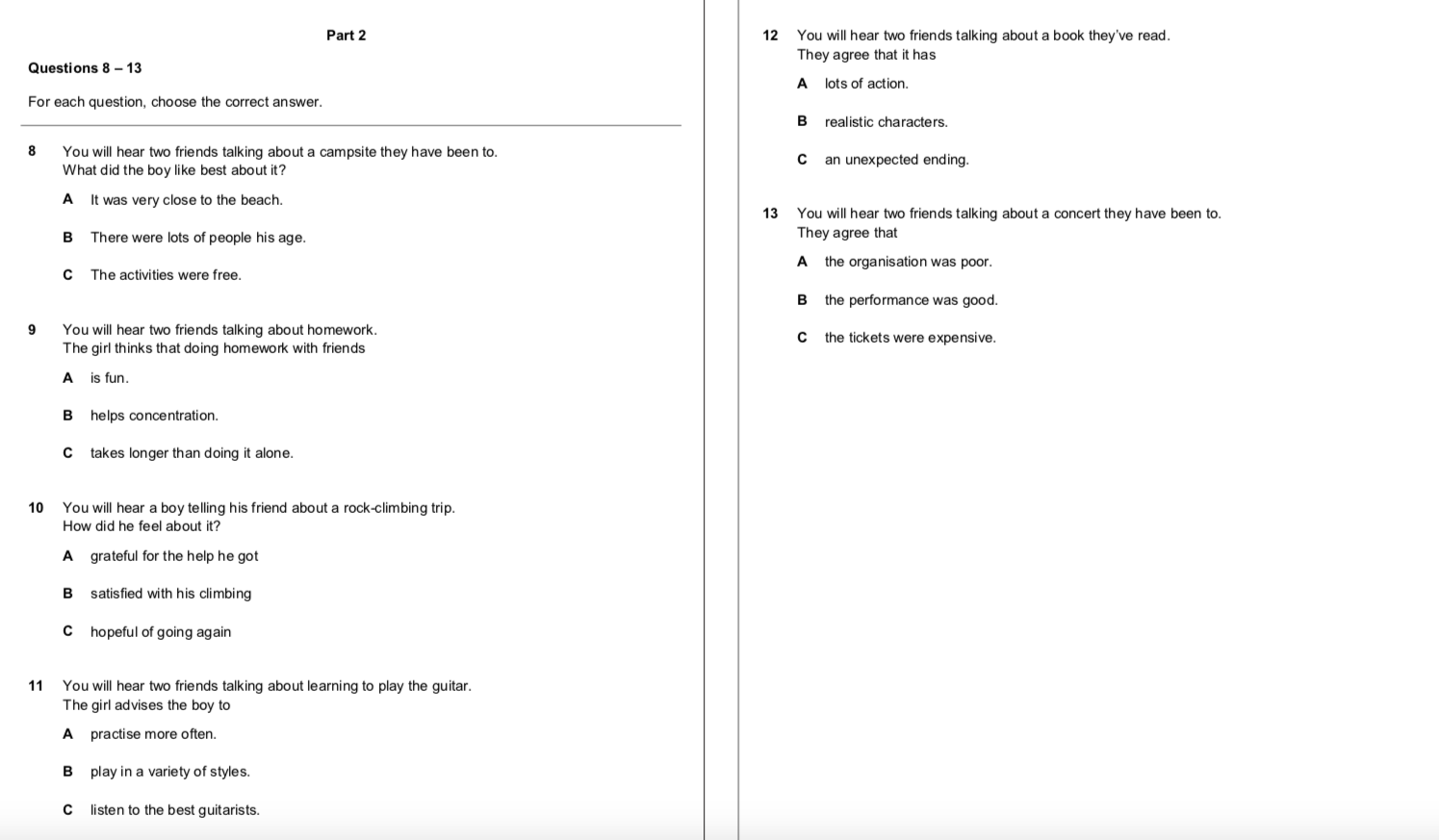
The six questions here test a range of things. Let’s consider what each question tests and let me share some tips for these kinds of questions.
Question 8

Here, we will listen to two friends. The context sentence above the question tells us this.
The question
The question is both written on the question paper/computer screen and it is also heard at the start of the audio the first time it’s heard.
There are two things to notice about the question: We are interested in the boy, not the girl. And the word ‘best’ is extremely important. He will probably mention other things he liked, that match the wrong options.
Tips
Check whose opinion you are listening for.
Notice little words like best, most in the questions.
The options
As always, all three options are referred to. The girl liked the location, close to the beach. The girl mentions the facilities, not the boy. But he does say ‘The pool’s good enough for me. I had the best time ever – so much to do!‘ This could lead students to choose C, but there is no mention of free activities.
The correct option
And notice that it’s the girl who first mentions ‘loads of other teenagers‘. The boy then replies: ‘That’s why I’d go back any day – in other camps you don’t get that sort of crowd.‘
So, getting the right answer depends on picking up on information from both speakers.
Question 9
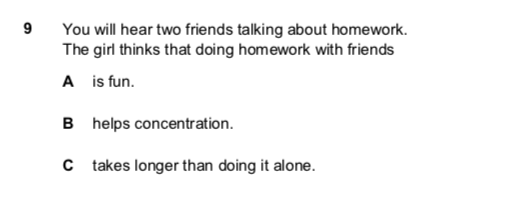
The question
This time, it’s the girl we’re interested in. And we need to understand her opinion about doing homework with friends. More than an opinion though, like question 1, this question tests understanding detail again.
The options
Like question 1, we need to understand things that both speaker say in order to get the right answer (A).
Boy: I suppose it would make it less boring, having a few laughs and some jokes here and there.
Girl: That’s exactly it ..
C is definitely not correct, because the girl says the opposite: that ‘you can do it in half the time it takes you on your own, ..’ But comparatives are difficult to process. They take mental effort.
Wordspotting
B might be tempting, because on the audio, the girl says ‘But if it’s something you need to concentrate on, ..’ Students might hear the word ‘concentrate‘ and match it to ‘concentration’ in B.
Tip
Tell students that Cambridge likes to trick them with wordspots – they take you to the distractor, not the right option!
Question 10
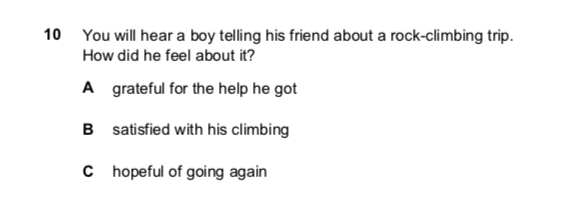
In this question, we’re interested in the boy. How he felt about his rock-climbing trip.
Adjectives for feelings and opinions
In the Appendix of the B1 Preliminary wordlist, there is a whole section on Personal Feelings, Opinions and Experiences (Adjectives).
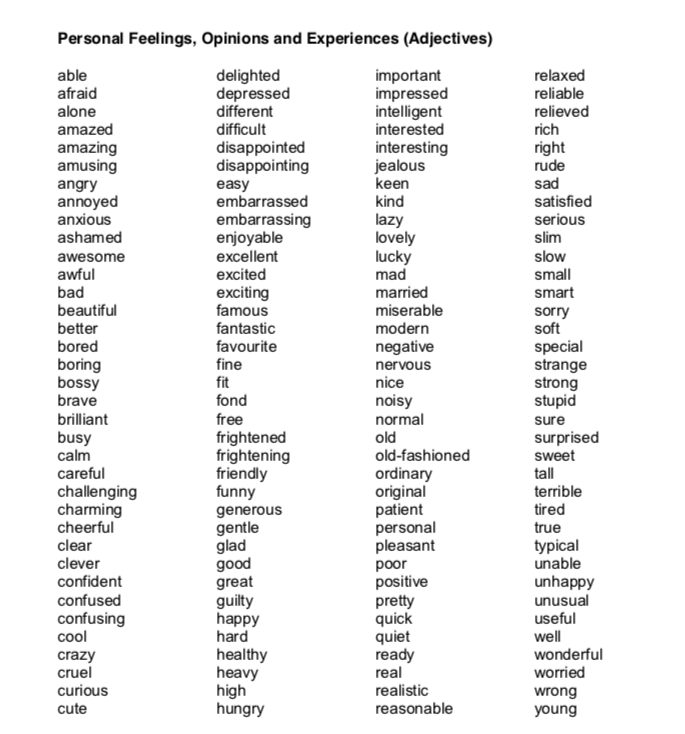
As you can see, it’s a long list!
Some of the words are probably already familiar to our students: hungry, tired, wrong, young, for example.
But others, like ashamed, curious, disappointed might be new for them.
Tip
It’s important to teach adjectives for feelings and opinions for Listening Part 2.
And the challenge here is also for our students (especially our younger students) to understand both the concept of these adjectives and how we express those emotions when we speak!
In these options, grateful and satisfied both refer to an attitude to something in the past, whereas hopeful points to the future, doesn’t it? * Interestingly, neither grateful or hopeful are on the list!
The correct answer is C – hopeful of going again. The boy says: ‘I’m looking forward to having another try..‘.
A is not correct because he says ‘You need to have someone with you who’s got a lot of experience, who can tell you what to do or give advice.‘ and later ‘I’ll tell whoever I’m with that I need support.‘ He didn’t get any help. Many students might choose this answer because they do not know the meaning of grateful.
B is not correct. He is satisfied with his climbing skills on an indoor climbing wall, but not on this trip.
Questions 12 and 13
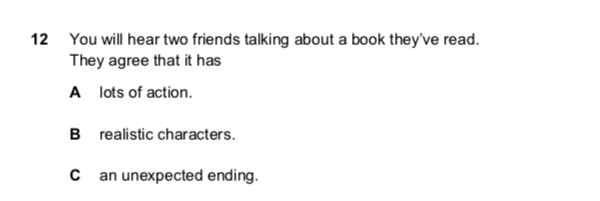
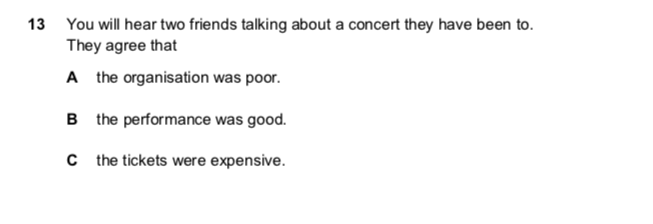
Both of these questions focus on understanding agreement.
Tip
For agreement questions, students should NOT expect to hear expressions like ‘Yes, I agree.’ or ‘You’re right.’ Agreement is usually shown because BOTH SPEAKERS MAKE A POINT.
Let’s have a look at the tapescript for Question 12.
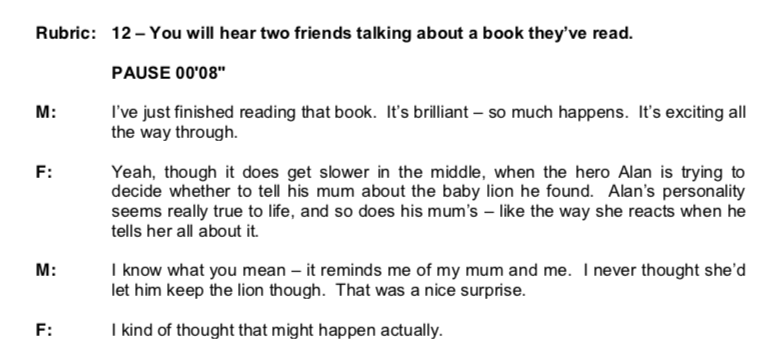
A is tempting. The boy says: ‘so much happens. It’s exciting all the way through.’ Then, the girl’s reply starts with ‘Yeah’ before she contrasts with ‘though it does get slower in the middle, ..’.
C is not correct because only the boy thought the ending was unexpected.
B (the correct option) comes fromthe girl saying: ‘Alan’s personality seems really true to life – and so does his mum’s..’. The boy then replies with ‘I know what you mean ..’
Tip
For agreement, both speakers have to make the point.
I train students to put a tick/+ or other symbol next to the options when they are mentioned.
A lots of action. +
B realistic characters. + +
C an unexpected ending. +
Two ticks/+s = the right option.
Wording of questions
To finish, I’ll just mention the typical wording of the questions and what they focus on. I’ve divided them into Focus on one speaker and Focus on both speakers.
Focus on one speaker
What does the girl/boy/woman/man say about it? (understanding details)
What did the boy/girl/man/woman like best about it? (opinion)
How does he/she feel about it? (feeling/attitude)
The boy/girl thinks that …. (feeling/attitude)
The boy/girl wants the girl/boy to .. (understanding details)
The girl/boy advises the boy/girl to (opinion)
Focus on both speakers
They agree that
They think that
As always, I hope you find this post useful and don’t forget to check out my other posts where I analyse the different parts of the Cambridge exams and share tips. See my previous post for more insights on B1 Preliminary Listening Part 2 and the posts on Part 1 too.

